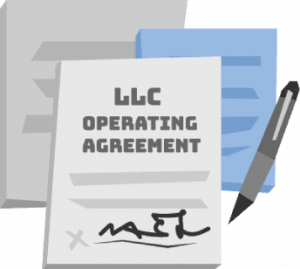How to Start an LLC in Indiana
Considering starting a Limited Liability Company (LLC) in Indiana? Smart choice. An LLC offers liability protection, creating a distinction between you and your business. By default, LLCs are taxed as pass-through entities, meaning the LLC itself doesn’t pay taxes but the profits pass-through to the owners and are reported on their taxes.
To get started, you’ll need to submit Articles of Organization to the Indiana Secretary of State and pay a $98 state filing fee ($100 for mail filings). Follow the steps below to set up your Indiana business.

1. Name Your LLC
Let’s start with the name of your LLC. Indiana has some rules you’ll want to follow to make sure your name is good to go (those rules are covered in Indiana Code § 23-0.5-3.) Here’s what you need to know about choosing a business name for your LLC in Indiana.
- Your name needs to be available to use in Indiana.
- Your name must be distinguishable (different enough) from other registered domestic and foreign companies.
- Your name must contain the phrase or abbreviations: limited liability company, LLC, or L.L.C.
You can search business names in Indiana to check if your prefered name is available.
You can reserve an LLC name in Indiana for $10 by applying through the Indiana online portal INBiz web portal. Your LLC name is reserved for up to 120 days and can be renewed for another 120 days. There is no paper form for the Indiana business name reservation.

2. Register Your Domain Name
Next up, you’ll want to secure a domain name for your website. Why are these important? Just like you need a street address to help people find you on a map, you need a domain name to help people find you on the web.
For domain names, it’s better to register earlier rather than later. There are two basic reasons why:
- Credibility: When you bother to establish a professional domain name, you’re letting customers know you take your work seriously.
- Consistency: A domain name that connects to your brand name makes it simpler for customers to remember you, which makes them more likely to seek you out.
At Northwest, we offer domain names in-house. You’ll even get a free year of domain name registration when you hire us to form your business.

3. File Indiana LLC Certificate of Organization
Now, you’ll need to submit your Indiana Articles of Organization (LLC) to the Secretary of State online, by mail, or in person. This is the step that officially forms your LLC with the state. Here’s what the form asks for.
Your company name is the official name of your LLC and must be unique in Indiana and contain limited liability company, LLC, or L.L.C.
Indiana’s Secretary of State requires a business email or contact email of a member if the business doesn’t have an official business email. The email you put here is not visible to the public.
In case the Indiana Secretary of State needs to return the documents to the sender, you’ll need to provide a return address, telephone number, and email address (if you have a different contact one than the one you listed for your business email.) Like your business email, your return address is not listed on the public record.
The principal office of your business is the main office of your business. Your principal office does not need to be based in Indiana, but it does need to be a physical address and not a PO Box.
A registered agent accepts service of process or legal mailings on behalf of your business. In Indiana, you can be your own registered agent or hire a registered agent service like Northwest. Indiana outlines its laws for registered agents in Indiana Code § 23-0.5-4-11.
Your Indiana registered agent must:
- be based in Indiana with an Indiana physical address
- be available during regular business hours
On your Indiana Articles of Organization, you’ll need to select whether or not you’re using a commercial registered agent (aka a business) or a noncommercial registered agent (a person). You will also need to provide your registered agent’s address.
Tip: Northwest Registered Agent is a top-rated registered agent and business formation service. We not only act as your registered agent, but we let you list our address on your Articles if you’d prefer to keep your private information off the public record.
If you’d like to include your registered agent’s email, you may do so here.
Only starting your business for a designated period? You can include your dissolution date on your Indiana Articles. There is an option for keeping your LLC ‘perpetual,’ which just means your LLC will stay formed until you dissolve your business.
You’ll need to share your LLC management type and who will run it. Indiana offers two options to choose from manager-managed and single-member-managed. If you’re the only member and owner of your LLC, then you’d select the single member LLC option.
Whoever completed the Articles and is submitting them to the Indiana Secretary of State must print their name and title and provide a signature.
Indiana Series LLC
A series LLC is an LLC with multiple LLCs within it. Series LLCs are businesses that have other businesses within them, each viewed as their own company. Here’s the scoop on starting a series LLC in Indiana: you’ll need to submit the Articles of Organization Domestic Master Limited Liability Company with the Indiana Business Services Division.
You can submit your form by mail, in person, or online. The fee to submit and file your Articles of Organization for your Indiana Series LLC costs $250.
How do you submit the Indiana Articles of Organization?
To submit your Indiana Articles of Organization to the Indiana Business Services Division, you can file online, in person, or by mail.
By mail or in person:
Secretary of State
Business Services Division
302 West Washington St. Rm. E018
Indianapolis, IN 46204
Online:
InBiz web portal

4. Adopt an Operating Agreement
Your operating agreement is like the blueprint for how your LLC will run. It’s where you jot down all the important stuff, like who contributed what financially, how decisions are made, and even what happens if things don’t go according to plan. Technically, Indiana doesn’t require you to have an operating agreement, but having one is a smart move for legal protection and just keeping everything running smoothly.
Tip: Our attorneys have already drafted up an initial Indiana LLC operating agreement template that you can use for free.

5. Get an EIN
An Employer Identification Number (EIN) is what the IRS uses to keep tabs on your business for tax purposes. Needless to say, it’s important to have for your LLC in Indiana. Don’t worry, though, getting an EIN is totally free. You can apply for one directly from the IRS online or learn why many business owners choose us to get an EIN for them.

6. Get a Business Bank Account
Getting a business bank account for your LLC is something you should consider doing to help strengthen the liability protection your LLC has. When you head to the bank to open your account, make sure you’ve got these essentials with you:
- a copy of your LLC Articles of Organization
- your LLC’s operating agreement
- the EIN for your LLC
If your LLC has more than one member, you may need to provide an LLC resolution for banking account.

7. File Business Entity Report & Pay Taxes
Any LLC that sells goods (physical items you don’t own like clothes at a retail store) or tangible personal property (physical items you do own like cars a mechanic buys and resells) must get a Registered Retail Merchant Certificate to collect the state’s 7% sales tax. To get the Indiana Registered Retail Merchant Certificate, you’ll submit the Indiana Business Tax Application and pay a $25 fee.
Indiana requires all LLCs to submit a Business Entity Report biennially or every other year. It costs $32 to file online and $50 to do so by paper. Some states call this type of report an annual report. Its purpose is to gather any information about your LLC that may have changed since your last filing like your business’s owners, location, or name.
Want more details? Use our guide to learn how to file a business entity report in Indiana.
Ready to Start an LLC in Indiana?

